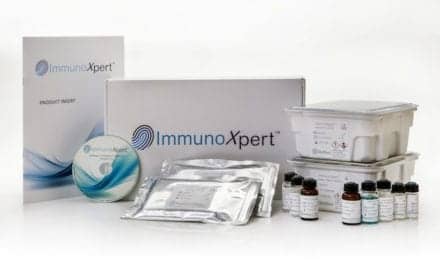The Oncotype DX genomic prostate score (GPS) from Exact Sciences, Madison, Wis, is a strong independent predictor of critical outcomes in patients with unfavorable intermediate (UFI)-risk prostate cancer, according to a recent study.1
“While men with very low-, low-, and favorable intermediate-risk prostate cancer often choose between active surveillance and treatment, men with unfavorable intermediate-risk disease must make decisions about how aggressive their treatment plan should be,” says Jennifer Cullen, PhD, MPH, associate director of cancer population sciences at the Case Comprehensive Cancer Center in Cleveland. “These new findings, which demonstrate for the first time the GPS test as a strong predictor of critical endpoints in UFI-risk disease, indicate that Oncotype DX testing can aid physicians and UFI-risk prostate cancer patients in their decision-making process. The GPS score may help in decisions regarding treatment intensity and empower patients in their care choices.”
For the recent publication, additional statistical analyses were conducted of GPS results from two previously published cohort studies in men treated with radical prostatectomy. The study included 299 intermediate-risk patients, 175 of whom were classified as UFI-risk. Results showed that UFI-risk patients with a GPS test result of less than 40 had outcomes consistent with high-risk disease and a poor prognosis, indicating they may benefit from more aggressive therapies. In contrast, UFI-risk patients with a GPS value of less than 40 had outcomes similar to favorable intermediate-risk patients, suggesting less aggressive therapy may be needed.
The GPS test has been shown in multiple studies to be a strong independent predictor of several critically important outcomes in men with very low, low, and favorable intermediate-risk prostate cancer. Findings from the new analyses support guideline inclusion of the GPS test in the broader population of UFI-risk patients.
For more information, visit Exact Sciences.
Reference
1. Cullen J, Kuo HC, Shan J, et al. The 17-gene genomic prostate score test as a predictor of outcomes in men with unfavorable intermediate risk prostate cancer. Urology. Epub. June 7, 2020; doi: 10.1016/j.urology.2020.05.045. Available at https://bit.ly/384Zj1c.
Featured image: CPDR study: BCR risk stratification using GPS result at cutoff 40 in Unfavorable Intermediate risk (n = 72). FI patients (green curve), UFI patients with GPS ≤40 (blue curve), and UFI patients with GPS >40 (red curve). The outcomes of UFI patients with GPS ≤40 are very similar to patients with favorable intermediate risk disease. Courtesy Urology.




